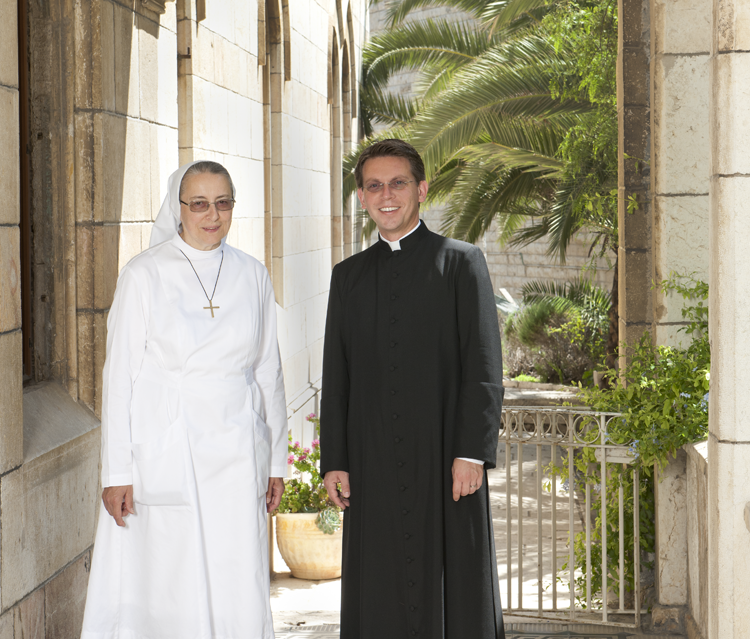In Jerusalem's Muslim quarter, an Austrian Hospice serves peace and strudels
The hospice aims to be self-supporting but has guaranteed financial backing by the Catholic Church. Photo courtesy of Markus Stephan Bugnyar.
JERUSALEM– Tucked away behind a locked gate deep in the heart of the Old City of Jerusalem's Muslim Quarter – a place where some souls are wary to venture – lies an oasis of Gemutlichkeit (hospitality), apple strudel and spiritual peace that belies the reality of the Middle East conflict.
For nearly 160 years the Austrian Hospice of the Holy Family has stood at 37 Via Dolorosa at the corner of al-Wad Street – on the main alley which leads south from the Damascus Gate to the Western Wall.
"The Austrian Pilgrim Hospice in Jerusalem is the oldest Christian guesthouse in the Holy City. We create jobs, concern ourselves with social issues and place particular emphasis on intercultural dialogue," smiles the hospice's Vienna-born rector Markus Stephan Bugnyar, 44.
Among the hospice's recent programs was a musical performance by local sufis.
A view of the Old City from the hospice. Photo by Markus Stephan Bugnyar.
Bugnyar studied theology at the University of Vienna before coming to Israel to study at the Benedictine Dormition Abbey on Mount Zion and the École biblique et archéologique française de Jérusalem. Appointed rector in 2004, he presides over a building that wouldn't look out of place among the imperial palaces of Vienna's Ringstrasse.
Indeed the hospice has been fit for a king. Emperor Franz Josef slept here in 1869 on his way to the opening of the Suez Canal, and the exquisite royal chapel is dedicated in his honor.
The metal military-style cot on which der Kaiser slept has been preserved. But Bugnyar doesn't recommend it. Franz Josef had simple tastes, he explains, and the bed isn't very comfortable.
Nor was Franz Josef the last member of Hapsburg royalty to visit. Georg der Herzog von Hohenberg – the grandson of Franz Ferdinand, the heir to the Austro-Hungarian throne whose assassination in Sarajevo on June 28, 1914 triggered World War I – slept here in 2004.
The view from the hospice roof terrace. Photo by Markus Stephan Bugnyar.
The hospice contains 25 double rooms.
"We're not trying to compete with hotels," explains Doktor Catharina Wolff, 50, the Cologne-born veterinarian who has served as the guest house manager for 15 years. Private double rooms with an en suite bathroom cost €35 per person including breakfast. The 40-bed dormitory is considerably cheaper.
"I'm more interested in humans than animals," she notes drily.
The guests are evenly divided between pilgrim groups and individuals, she says. Most come from central Europe with some coming from America. For many, it's both a corner of der Heimat (the homeland) and an exotic experience punctuated by the muezzin's call to prayer at 3:30 a.m.
But it's the Wiener Kaffeehaus, its adjoining garden and the spectacular roof terrace which are the main attractions for locals, some 800 of whom come every weekend to sample the delicious Gugelhupf, Sacher torte, Wiener schnitzel, goulash and other typisch Delikatessen (typical delicacies).
What is the secret of the famous apple strudel?
“It has no secret,” says Jiries Abdallah, 34, who started apprenticing 13 years ago as one of three chefs at the café. “We make it with heart, with love, with peace.”
The chefs are all sent to Vienna to perfect their skills. Prices on the bilingual German-English menu are all set in Euros. The strudel costs €2.50.
While the hospice aims to be self-supporting, and uses any profits to restore the aging complex, funds from the Catholic Church in Austria guarantee the building’s operation.
During the second Intifada, which broke out in 2000, occupancy never exceeded 15 percent, notes Bugnyar.
The hospice is able to stretch its budget thanks to volunteers, of whom there are currently nine from Austria, Germany and the Czech Republic. Desiree Haas, 18, spent three months at the hospice before returning to Vienna last Sunday.
“It was wonderful,” she says. “You learn a little bit of everything – reception, guest service, cafeteria, kitchen, room service.”
The rooftop restaurant seating of the hospice. Photo by Markus Stephan Bugnyar.
As well, the staff is currently supplemented by four Austrian “civil servants” – conscientious objectors who opt to spend a year there in lieu of military service.
What does Bugnyar say to people who feel east Jerusalem is dangerous?
“It’s safe to come to the Old City. But we respect Israelis who don’t wish to visit here. There are some barriers which are emotional rather than realistic.”





